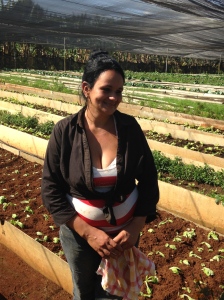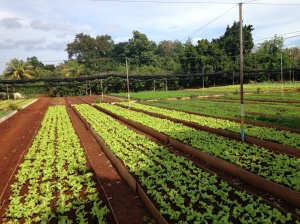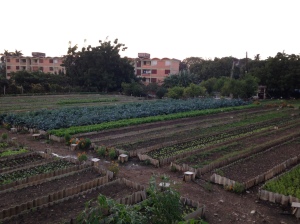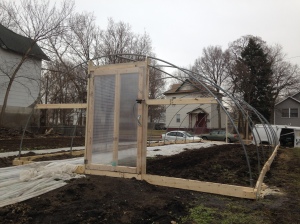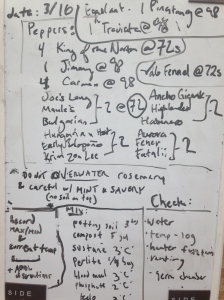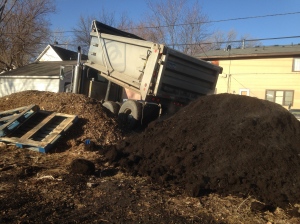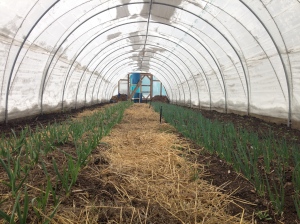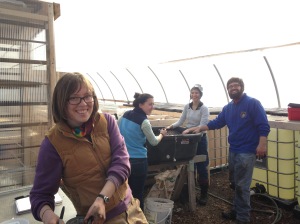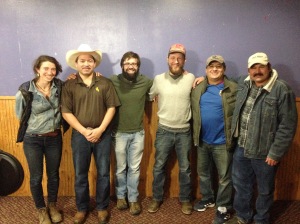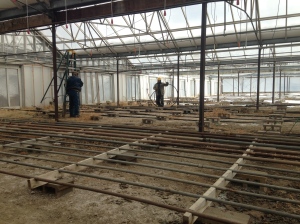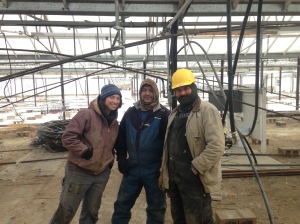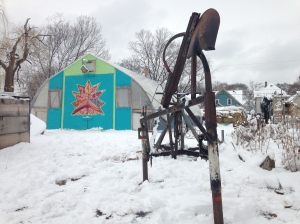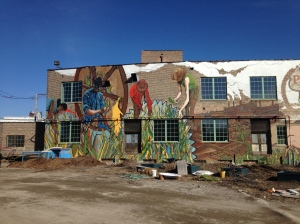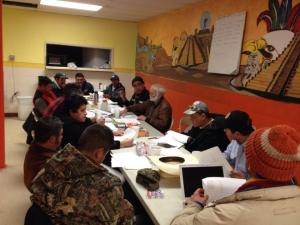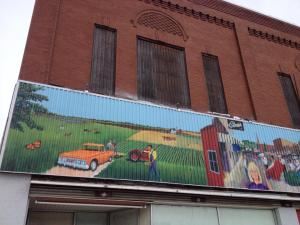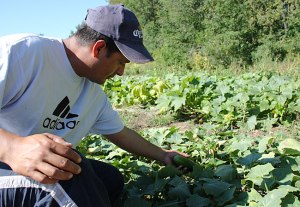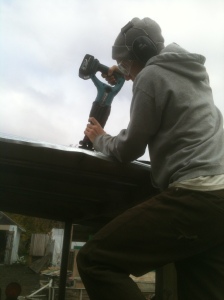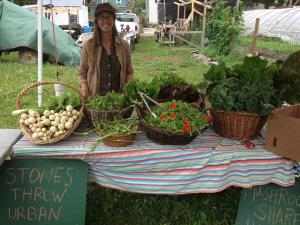
Farm community:
As the year draws to a close I would like to take a short written moment to reflect on the past year, discuss plans for the coming year(s), and give a heartfelt thanks to all our our collaborators, supporters, and customers. We have had a busier than usual fall, continuing on many projects and late-season markets, leaving little time for reflection. Below is a smattering of thoughts and ideas about food, agriculture, and the farm.
This fall an abrupt, early snowfall largely ended the season at the beginning of November. However, small trials of carrots and spinach in our high tunnels allowed us to harvest beautiful produce into the middle of December. We placed piles of actively decomposing brewery waste and woodchips into the corners of the high tunnels as an additional heat source. While we were unscientific in our process and cannot say for sure if the piles made a difference, the soil remained unfrozen through a series of sub-zero, cloudy days in late November. Carrots emerged sweeter and crunchier than any regular season carrot we have produced. During the next several seasons, our hope is to “even” the season out – trading full-on summer exhaustion for sustained, year-round production. Expect micro-greens in mid-winter and fresh kale in December as we improve.
We have been reflecting on the aims of the urban farm business and how its goals, aims, and actions are intertwined with the social and political events regarding U.S. racial politics and the ever-pressing need to deeply examine the role of race in our society. The alternative farm movement must confront how race and class play a role in food production and distribution in the United States and how U.S. food demand and trade policy impacts the global economy. The “local” food economy must be expanded to envision how a just and healthy food system is manifested throughout the world. Farm work, especially, has historically been delegated to the most disadvantaged members of society. The exploitation of Latino farmworkers throughout the Central Valley is a modern-day manifestation of a process that has subjugated immigrants and people of color to demeaning and abusive agricultural work for centuries. The development of small farms that are focused on sustainable food systems, the proliferation of farmer’s markets and locavore restaurants that support small farms while catering to the uber-wealthy, and the public health and education imbalances in America that reflect race and class disparities are interconnected and interdependent. The small farming and local food movements must connect closely, collaborate, and stand in solidarity with farmworker justice movements and activism regarding racial and social justice, constantly expanding and challenging how alternative food production plays a role in these dialogues. Ecological farming is as much a socio-political process as it is biological. As Eric Holt-Gimenez of FoodFirst stated in light of the juries failure to indict Darren Wilson in the Michael Brown case, “We can’t have a judicial system, or an impartial law enforcement system, or build a sustainable food system [my italics] on the foundation of an oppressive social and economic system“. The local food movement must discover how to be an inclusive, empowering space that does not allow idealisms of agrarianism, hyper-local production, and the like, to blur its capacity and obligation to develop systemic change across the food system. While our farm does not have the answers (and believe the ‘answers’ must come from a diversity people and collaborative processes), we plan to engage in more and more conversations and activism for a more just food system. We hope you will join us and will report on the actions we take and the discussions we have.
The farm has been discussing its focus issues in terms of food production for the coming year. We are enthused about continuing to figure out how to produce the best vegetables using the most efficient and low-external input methods possible. Caroline and I attended a day-long soil health workshop at Common Harvest Farm in Osceola, WI, discussing the best soil and weed management methods with many different types of farmers including vegetable producers, dairy farmers, and grain growers. We are inspired by the work of veteran farmers who are incorporating sophisticated science to manage nutrients, cover crop, and produce excellent produce. Our farm will continue our composting, collaborating with local breweries and landscape companies, to create healthy soil while recycling nutrient into our urban agroecosystems. We hope to work with an intern this spring to monitor the piles, tracking temperature, humidity, and nutrient composition of the finished compost. We also have plans to continue investing in vegetable production infrastructure including a flame weeder, walk-behind tractor tools, and wheel hoes. These types of small-scale farm implements are essential components of intensive vegetable production that is ergonomic and efficient. The farm will also be collaborating with our friend Andrew Pierre, a bike guru who will be starting his own farm in River Falls, Wisconsin this spring, to construct a second prototype of our human-powered salad spinner. Our urban greenhouse should be teaming with plants by early March – please stop by the 15th Avenue farm plot this late winter to treat yourself to a respite from the cold.
After much hard work by Caroline, Eric and the support of neighborhood organizations and you all, we have secured a long-term lease on a large plot at 625 Dale Avenue in Saint Paul to create a farm hub. We are so excited to be investing in hoop houses, perennial plants, community garden beds, and a market stand. We hope this will “root” our Saint Paul production for years to come. Lots of farm energy will be devoted to building beautiful urban food infrastructure. The farm is pleased that the City of Saint Paul has recognized the necessity of permanent land for urban agriculture. While a long-term lease does not secure the land indefinitely, we hope this is a large step in the direction of establishing increased access to permanent food production land in the Twin Cities.
The farm’s participation the producer’s cooperative, Shared Ground Farmer’s Cooperative, will continue. Exciting developments are occurring as Rodrigo Cala has purchased greenhouse for installation on his farm and Agua Gorda Cooperative is seriously exploring securing farmland near Long Prairie, WI. Whetstone Farm has achieved laudable stability as it purchased a farm in Amery, Wisconsin, joining an active, growing community of young farmers. The farmers spent last Monday discussing the crop plan for the coming year. Expect new crops such as rhubarb and improved quality and consistency.
As stated in the last post, the farm is in the process of hiring a full-time employee for next season. As we look for good employees and think about how the farm can best honor their efforts and empower them to build agricultural skills, I must state, one more time before the year ends, how appreciative we are of the past year’s crew of employees, volunteers, and interns. In a hectic environment in which tools break, work is dirty and stressful, tensions are often high, and perfection is crucial, a large group of people showed up throughout the season, selflessly devoting time and energy to the farm project. Employees often worked long past their scheduled hours to clean carrots or stake an additional row of tomatoes. A CSA member traded a few more vegetables for invaluable electrical installation help. The farm would not exist without this multitude of selfless efforts.
In the coming year we hope to continue collaborating with individuals and organized groups in Saint Paul and Minneapolis to develop an innovative, effective, and equitable urban food system in the Twin Cities. While our experience lies in the world of intensive vegetable production system, we take cues from and hope to learn from the wealth of social justice activism and expertise regarding urban food work in the Twin Cities. Collaboration among seemingly disparate interests, among rural and urban food producers, community activists, and food consumers (i.e. all people) is central to building new food economies based on regeneration and resilience. To quote Mateo Nube of the Movement Generation Justice and Ecology Project regarding the construction of new economies, “When I use the phrase ‘Oppositional economy’ I don’t mean just naming something we’re against, but by oppositional we mean creating a set of economies that are contesting actively for access to capital, labor, water, land so that it can create a new center of gravity.”
Many thanks for the support throughout 2014. We are excited to produce vegetables in the Twin Cities in 2015 and beyond. Our farm will be traveling to Cuba in January as part of an agricultural education trip. We will report back and fire up the farm in February. Have a safe and joyous holiday and don’t stop eating!
– Alex
P.S. Check the Shared Ground Farmer’s Cooperative website soon to purchase CSA shares for the 2015 season.
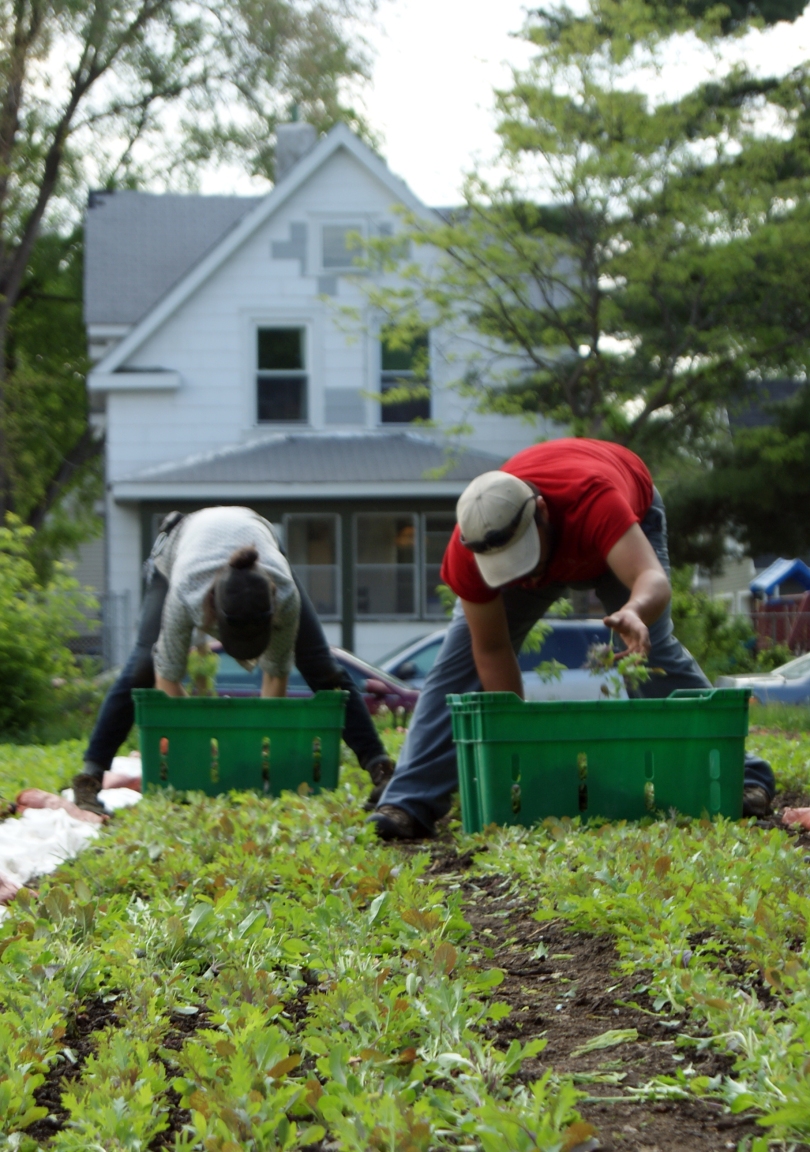
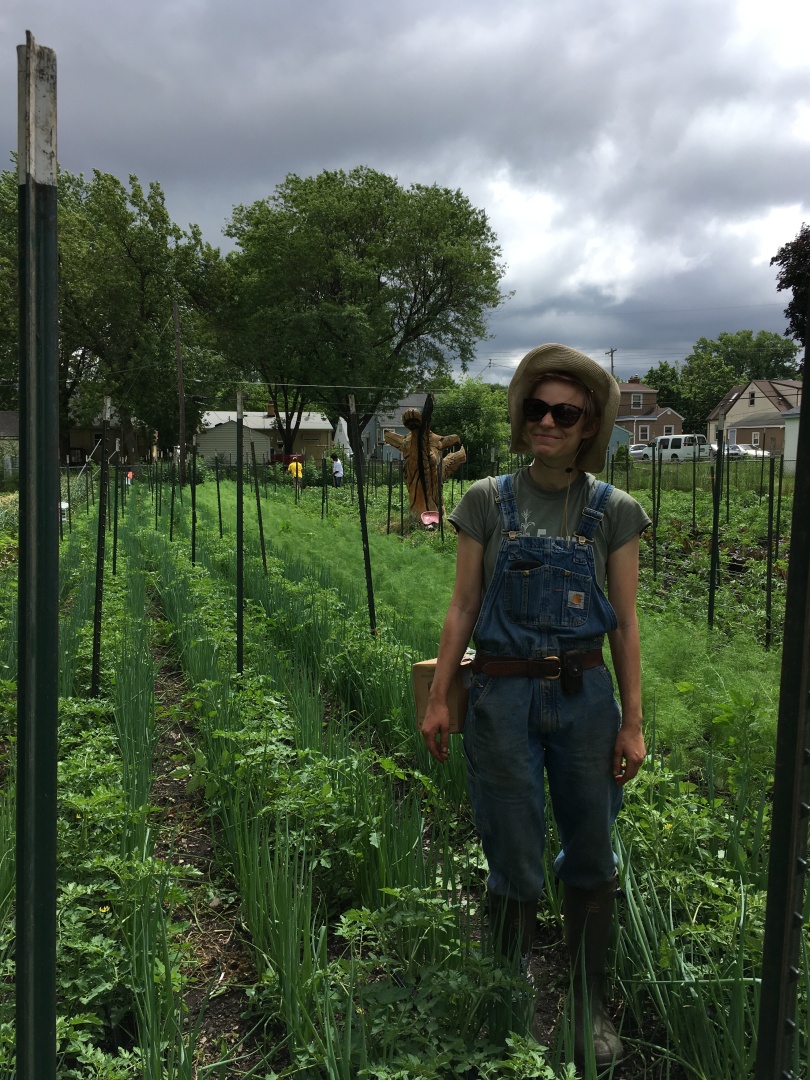
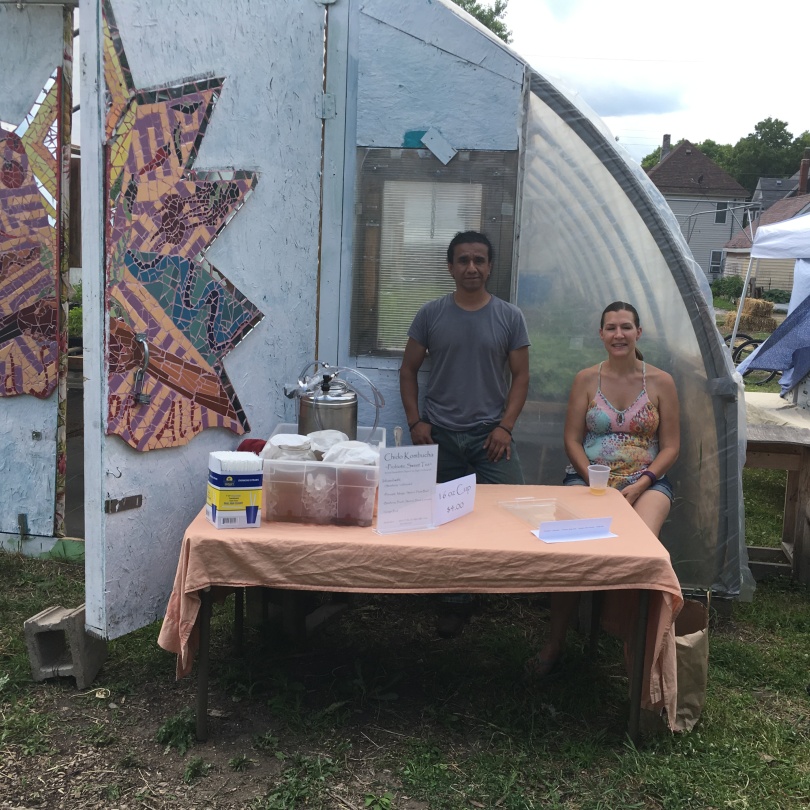
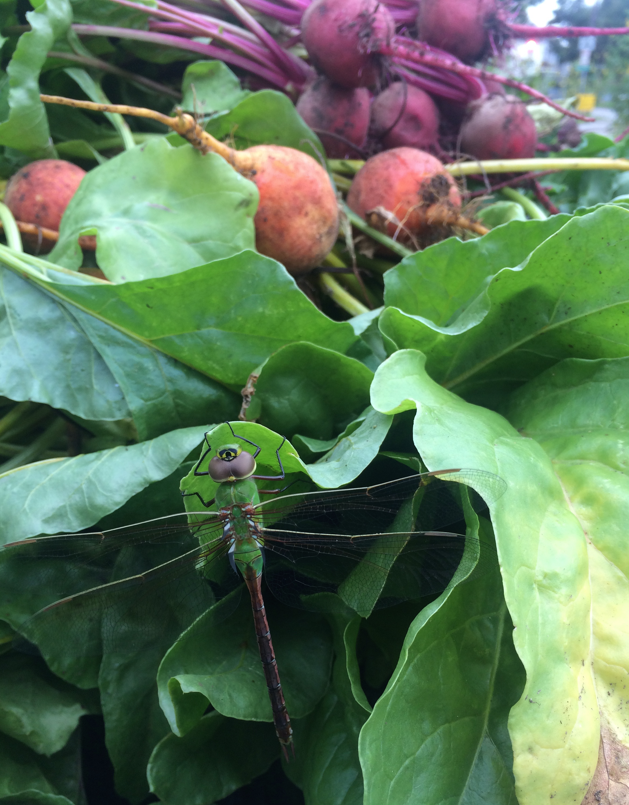
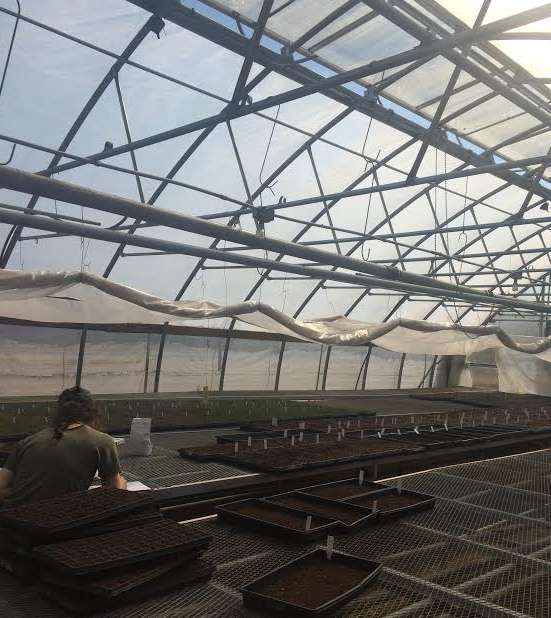
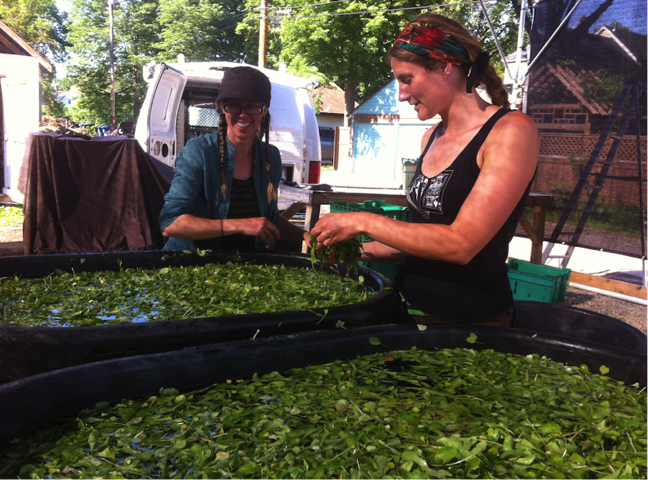
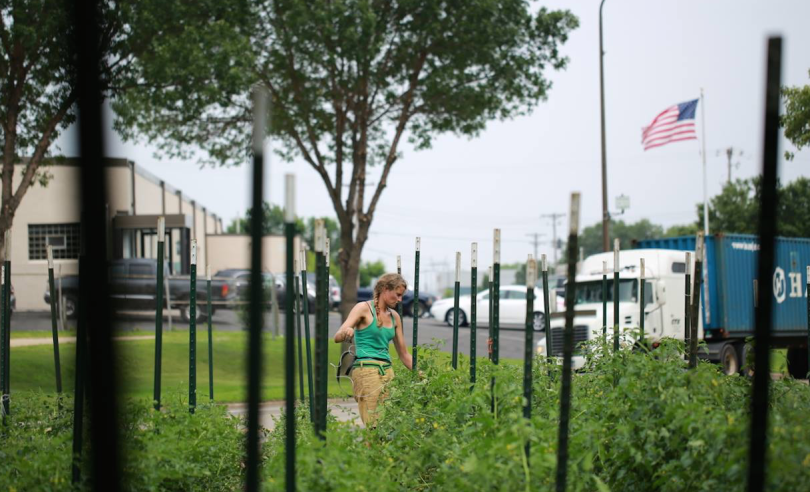 Hi All,
Hi All,
